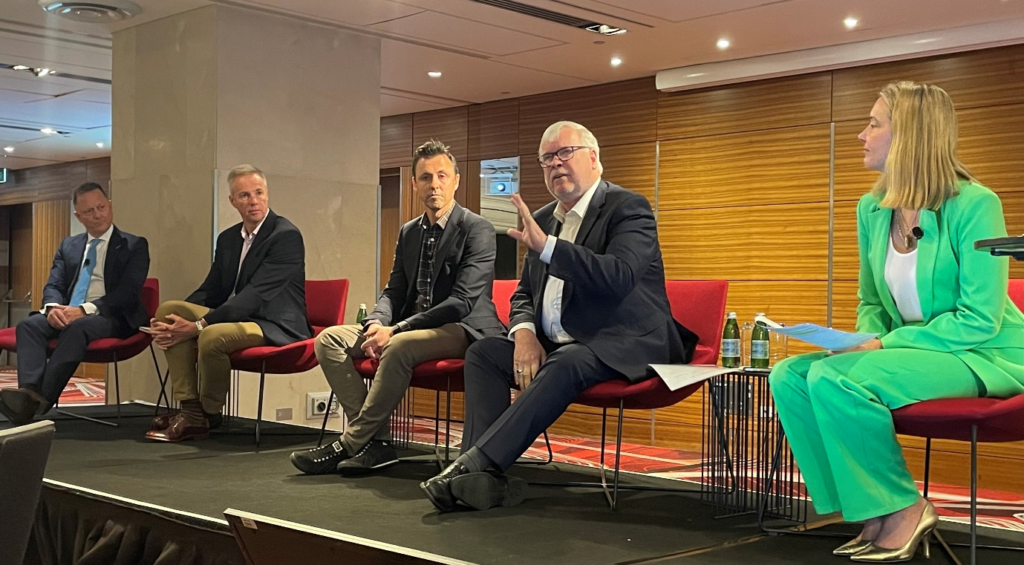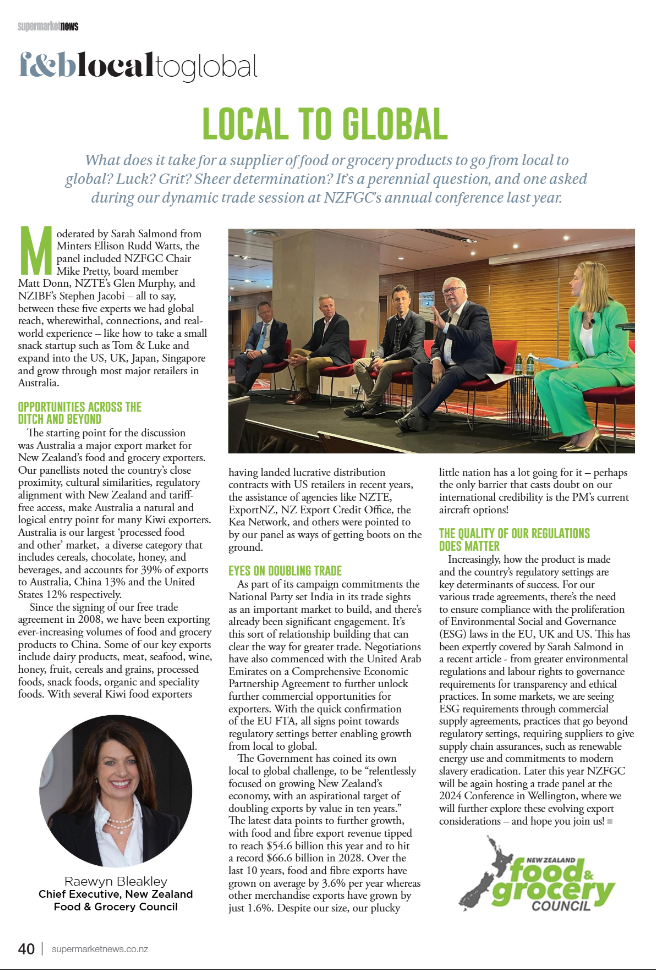Supermarket News Column: Local to Global
AUGUST 2024 – Supermarket News
Photo: NZFGC Annual 2023 Conference in Sydney, Trade Panel (L-R)) with Glen Murphy (New Zealand Trade and Enterprise) Mike Pretty (NZFGC Chair and non-executive Chair Kraft-Heinz Company ) Matt Donn (NZFGC Board Member and GM NZ Sugar), Stephen Jacobi (New Zealand International Business Forum) and Sarah Salmond (Minter Ellison Rudd Watts).
What does it take for a supplier of food or grocery products to go from local to global? Luck? Grit? Sheer determination? It’s a perennial question, and one asked during our dynamic trade session at NZFGC’s annual conference last year.
Moderated by Sarah Salmond from Minters Ellison Rudd Watts, the panel included NZFGC Chair Mike Pretty, board member Matt Donn, NZTE’s Glen Murphy, and NZIBF’s Stephen Jacobi – all to say, between these five experts we had global reach, wherewithal, connections, and real-world experience – like how to take a small snack startup such as Tom & Luke and expand into the US, UK, Japan, Singapore and grow through most major retailers in Australia.
Opportunities across the ditch and beyond
The starting point for the discussion was Australia a major export market for New Zealand’s food and grocery exporters. Our panellists noted the country’s close proximity, cultural similarities, regulatory alignment with New Zealand and tariff-free access, make Australia a natural and logical entry point for many Kiwi exporters. Australia is our largest ‘processed food and other’ market, a diverse category that includes cereals, chocolate, honey, and beverages, and accounts for 39% of exports to Australia, China 13% and the United States 12% respectively.
Since the signing of our free trade agreement in 2008, we have been exporting ever-increasing volumes of food and grocery products to China. Some of our key exports include dairy products, meat, seafood, wine, honey, fruit, cereals and grains, processed foods, snack foods, organic and speciality foods. With several Kiwi food exporters having landed lucrative distribution contracts with US retailers in recent years, the assistance of agencies like NZTE, ExportNZ, NZ Export Credit Office, the Kea Network, and others were pointed to by our panel as ways of getting boots on the ground.
Eyes on doubling trade
As part of its campaign commitments the National Party set India in its trade sights as an important market to build, and there’s already been significant engagement. It’s this sort of relationship building that can clear the way for greater trade. Negotiations have also commenced with the United Arab Emirates on a Comprehensive Economic Partnership Agreement to further unlock further commercial opportunities for exporters. With the quick confirmation of the EU FTA, all signs point towards regulatory settings better enabling growth from local to global.
The Government has coined its own local to global challenge, to be “relentlessly focused on growing New Zealand’s economy, with an aspirational target of doubling exports by value in ten years.” The latest data points to further growth, with food and fibre export revenue tipped to reach $54.6 billion this year and to hit a record $66.6 billion in 2028. Over the last 10 years, food and fibre exports have grown on average by 3.6% per year whereas other merchandise exports have grown by just 1.6%. Despite our size, our plucky little nation has a lot going for it – perhaps the only barrier that casts doubt on our international credibility is the PM’s current aircraft options!
The quality of our regulations does matter
Increasingly, how the product is made and the country’s regulatory settings are key determinants of success. For our various trade agreements, there’s the need to ensure compliance with the proliferation of Environmental Social and Governance (ESG) laws in the EU, UK and US. This has been expertly covered by Sarah Salmond in a recent article – from greater environmental regulations and labour rights to governance requirements for transparency and ethical practices. In some markets, we are seeing ESG requirements through commercial supply agreements, practices that go beyond regulatory settings, requiring suppliers to give supply chain assurances, such as renewable energy use and commitments to modern slavery eradication. Later this year NZFGC will be again hosting a trade panel at the 2024 Conference in Wellington, where we will further explore these evolving export considerations – and hope you join us!


